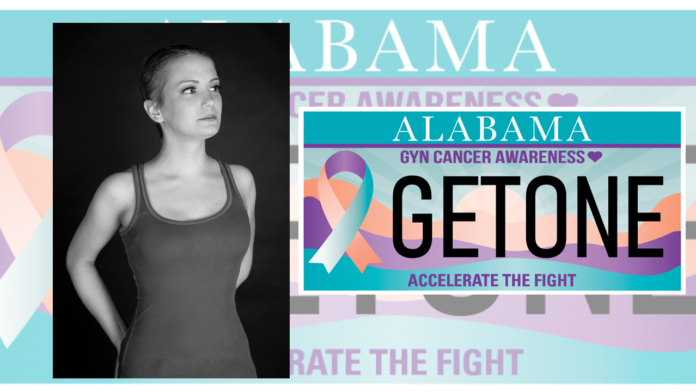
Laura Crandall Brown was just 25 years old when she passed away from ovarian cancer. Now, the foundation she helped start with her father, Jim Crandall, is trying to raise awareness and funds for those battling gynecological (GYN) cancers.
A new Accelerate the Fight Alabama license plate is currently being pre-sold; the sales will support the Laura Crandall Brown Foundation, which assists women with ovarian, cervical and other GYN cancers.
Pre-sales have to reach 1,000 plates for the new plate to be produced.
Jim Crandall explained, “We are in the process of getting all our pre-sales done. It kicked off June 1. We’ve gotten around 250-300 sold, but we still have a long way to go to get to the 1,000.”
The deadline for the pre-sales is May 31, 2020.
The foundation will receive $41.25 of the $50 from each purchase of the new license plate. The tag features the colors of three of the GYN cancers and was designed by Tiffeny Curier, a GYN cancer survivor and artist.
Crandall hopes to clarify one problem the foundation has encountered since the pre-sale began.
He said, “A lot of people say, ‘My tag doesn’t renew until November and I will get it then.’ Well, it’s not available in November and we have to get them pre-sold. Basically, you are reserving a tag and once they are available, you are notified and you get your voucher. You take the voucher to the tag office and get your new tag.”
For those with specialty tags who want to help, but don’t necessarily want the tag for themselves, Crandall suggests they consider sponsoring a tag for someone else.
“We will find someone who will want them,” he said. “We have a good network of survivors and patients that we can reach out to who would want a tag.”
The $50 fee is added to your tag fee each year. That is a contribution of $4.17 per month or 14 cents a day to support the Laura Crandall Brown Foundation.
Crandall said, “The impact it will make is so much more. All these funds will be used for patient support. It has to be used toward the purpose of your mission. We do a lot of support of patients going through treatment.”
The foundation helps women statewide with transportation and other financial hardships.
About Laura Crandall Brown
Laura Crandall Brown graduated from John Carroll High School. She attended the University of Alabama at Birmingham for two years before transferring to Auburn University, from which she earned a degree in hotel and restaurant management. Two years after graduation, she was working in Auburn at the Nixon Conference Center and living in Opelika.
She was an artist and loved to paint. Her artwork and prints are currently displayed at a church in Birmingham and available for purchase. She loved writing, music and reading. Her father said she was never seen without a book in her hand or nearby. She loved Auburn and attending Auburn football games
Brown was just 24 years old when she was diagnosed with ovarian cancer in early September 2008. She had been having some pain and thought she had some type of virus when she decided to see a doctor. The urgent care doctor did an ultrasound and sent her to the emergency room.
Said her father, “The gynecologist came in and he just said, ‘You’ve got a large cyst on your ovary and we’re going to take that out tomorrow and you’ll be fine.’ Two days later, she had surgery and (when) he walks in, he has a picture of it and he says, ‘Oh, it’s just a benign cyst. We’ll send it off like we always do and you’ll be up and going in no time.’”
A few days later, when the tests came back, Brown learned that things were not normal and she had a very aggressive type of ovarian cancer.
Crandall said, “I understand when a young person has something that, most of the time, it’s not going to be cancer. It usually hits women in later years, but that doesn’t mean it doesn’t happen. There was a little girl in Birmingham that was diagnosed right after my daughter and she was 6. She is 16 now and what she had to go through was incredible, the treatment she had to endure.”
He added, “It happens, and we can’t stress enough to women to pay attention, and if doctors are not listening to you, I mean, who knows better than you if something’s not right. Go find somebody else and keep knocking on doors until they do listen.”
Brown was engaged to be married when she received the diagnosis. She went through surgery and got married in November before starting chemotherapy.
Crandall said, “The doctors were not hopeful. The tumor type was extremely rare so she started in November and by February the cancer had spread quite a bit. The chemo was not working. We went to MD Anderson (in Houston, Texas) to see what they could offer. We went through some clinical trials that seemed to be working and hold promise. Like anything, some of those drugs are just too toxic and she couldn’t continue taking them.”
Brown passed away Dec. 14, 2009.
“She had been married just a little over a year,” said her dad. “A couple of months prior to her passing away, we talked about starting a foundation. Everything we heard was there is no screening test for ovarian cancer.”
Together, Brown and her father hoped to raise money for treatment and research into early detection. She was excited about their work prior to her passing.
The foundation received its nonprofit paperwork and officially formed in January 2010. Over the last 10 years, it has funded research totaling close to $500,000 for eight different organizations.
Crandall added, “We have funded direct support to women in treatment at about $175,000 and we have a support group for women. We meet with these women monthly and they offer emotional support and spiritual support.”
The foundation also has a women’s mentoring program. It holds numerous events to help raise awareness of GYN cancers.
“We feel like having this car tag will give us some sound financial footing, at least for the support side of things. We have seen how any cancer diagnosis can financially devastate a family- 100% of the car tag money will go out for women and their families in treatment.”
To pre-order the specialty car tag, go to www.thinkoflaura.org/cartag. To request assistance from the foundation, patients should speak to the social worker at the facility where they are being treated.
Copyright 2019 Humble Roots, LLC. All Rights Reserved.



















